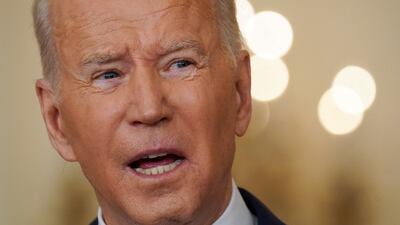US-Iraqi relations have taken a more diplomatic path under President Joe Biden’s administration in comparison to the Donald Trump era, experts have told The National.
Mr Biden was inaugurated a year ago and has shifted Washington’s policy by taking a softer approach when dealing with Iranian meddling in Iraq and the wider region.
“The Biden administration has a completely different view of Iraq and the region than the Trump administration,” said Renad Mansour, director of the Iraq initiative at London’s Chatham House.
“The Trump administration's legacy in Iraq will be centred around the very maximal policy against Iran in Iraq.”
Under Mr Trump, who served one term as US president between 2016 and 2021, Iraq was used as a “battle on the ground” for Washington’s conflict with Iran, Mr Mansour said.
In early 2020, a convoy carrying top Iranian general Qassem Suleimani and Iraqi militia leader Abu Mahdi Al Muhandis was hit by a US drone near Baghdad's airport. The two men were instantly killed.
Suleimani and Al Muhandis played key roles in co-ordinating militia operations against US and coalition forces in Iraq between 2005 and 2011 and, later, against ISIS.
Mr Trump said he had authorised the assassination in response to a wave of attacks on US interests in Iraq, including a fatal attack on American forces on December 27, 2019.
“When the Biden team came, they were much more interested in negotiating with Iran, putting back the JCPOA [Joint Comprehensive Plan of Action on Iran’s nuclear programme],” Mr Mansour said.
A new phase of US involvement in Iraq was announce at the beginning of Mr Biden’s administration — one which still involves “dealing with ISIS".
For the past year, Washington has moved “towards diplomacy and negotiation by seeking avenues for co-operation with Iran and so again it still means Iraq is still important to the US”, Mr Mansour said.
Iraq has been “allowed to free itself from Iran’s grip at a more gradual pace” under Mr Biden, said Michael Knights, a fellow at the Washington Institute for Near East Policy.
“The main amendment has been more US patience and understanding under Biden,” he told The National.
“US sanctions waivers for Iraq to import Iranian energy have been forthcoming and general US negotiations with Iran have lowered the temperature in Iraq.”
But Mr Biden’s team has stressed continuity in policy from the Trump period and the pre-2017 Barack Obama period when it comes to Iraq, Mr Knights said.
“The US is still in Iraq, still retaliating against Iran-backed militias when needed, and still supporting Iraq’s democratic process and re-engagement with the world.”
Years of war, insurgency, corruption and poverty have ravaged Iraq. Anti-government protesters have railed since 2019 against a lack of public services and have called for Iraq to put an end to external interference from Iran and the West.
But it remains unlikely that Mr Biden will completely abandon Iraq due to the influence of Tehran on Baghdad’s internal politics.
The US and Iran are entering a dangerous period in 2022, as Iran is closer than ever to having nuclear weapons capability, Mr Knights said.
Washington must come to a decision on whether it can “accept an Iran that has a hidden nuclear weapon or do something about it".
“Depending on which way it goes, Iran will either support ongoing stabilisation in Iraq or risk upsetting it by attacking US forces,” he said.
US troop presence in Iraq
Since 2014, US troops have played an active role in fighting ISIS. But last month, Washington's combat mission in the country was declared over almost two decades after it began.
The new plan stops short of a full-scale withdrawal; instead, the US military will remain in a training, logistics and advisory capacity. There are about 2,500 US troops and personnel still in Iraq.
The declaration sparked fears of a direct military confrontation between Washington and Tehran in Iraq.
Iran, which wields considerable influence in Iraq, said it would avenge Suleimani’s death, and since his assassination, US troops stationed in the country have come under continuous missile attacks.
Western security, military and diplomatic sites across Iraq have been the targets of dozens of rockets and roadside bombs for the past two years.
Iraqi and western officials blame hardline pro-Iran factions for the attacks, though they have not been claimed by any group.








